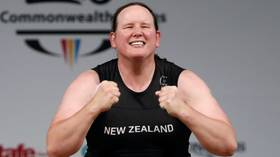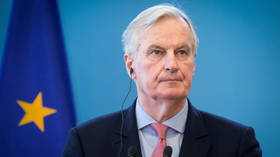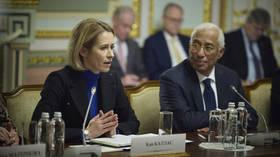Classification, not demonization, is the answer to sport's great transgender debate

Transgender athletes are often criticized, demonized and labeled as cheats when they are doing little more than simply competing within the rules. The issue isn't the athletes, it's the rules.
The hot topic of transgender athletes returned to the spotlight on Friday with the news of New Zealand weightlifter Laurel Hubbard's quest to qualify for the 2020 Tokyo Olympic Games.
Hubbard is an experienced weightlifting competitor, and competed as a man before transitioning gender seven years ago. Now aged 42 and competing as a female, Hubbard is on the brink of qualification for the Olympics, following her victory in the World Cup in Rome.
Hubbard's success, coupled with her well-documented transition from male to female, has brought plenty of criticism her way. But, in truth, the criticism needs to be aimed at those making the rules.
Also on rt.com 'Prioritizing fairness': World Rugby set to announce 'rugby-specific' transgender rules different to IOC policyHubbard has broken no rules, and fits the criteria to compete as a transgender female by the International Weightlifting Federation guidelines. Similarly, she will also be eligible to compete in Tokyo if she qualifies.
The rules, established in 2015, state that any transgender athlete wanting to compete as a woman must ensure their testosterone levels remain below 10 nanomoles per liter for a minimum of 12 months before their first competition. Hubbard met that criteria and has been a strong competitor ever since.
Critics will justifiably point to issues beyond the singular criterion of testosterone levels. Athletes who were born and grew up as males – especially those who grew up as male athletes – will already have a certain physiology that even the most highly-trained females could not match. Bone and muscle density between the genders post-puberty are different, and while a gender change, coupled with careful testosterone management, after that point may meet the criteria for competition, certain physical advantages may remain.
In that regard, it seems unrealistic to think that there can ever be a set of guidelines to fairly level the playing field to allow transgender athletes to compete equally in competition.
Also on rt.com How is that fair game? Year of hormonal therapy doesn’t make transwomen athletes weaker, study indicatesDoes this mean there should be no place for transgender athletes? Of course not. Sport is the celebration of the human body and a showcase for the excellence of athletic endeavor. But in pure competition terms, the only way to ensure these "controversies" do not consistently crop up is to create two additional classifications for athletes. As well as the established male and female classes, there should also be classes for male to female transgender, and female to male transgender athletes.
You need look no further than the Paralympics for examples of how athlete classification can help level the competitive playing field. Disabilities come in myriad forms, and while the Paralympic classification system isn't perfect, it does work. We're at the point where transgender athletes need similar classification.
As it stands, we see examples of male-to-female athletes stepping into female competition and standing out, but that doesn't mean there are similar issues with female-to-male competitors, who may find themselves physically unable to fully compete with lifelong male athletes for exactly the same reasons that male-to-female competitors can excel.
Also on rt.com Transgender debate, wiping Russia off the sporting map, & replacing retiring legends: Five big issues for sport in the next decadeSo, in order to allow all athletes to compete, regardless of their gender status and transgender journey, the introduction of two new criteria would help reduce controversy, promote inclusiveness and mean, in some cases, that athletes aren't forced to take hormone suppressants or other substances to force them to fit into a classification that doesn't really suit.
Transgender athletes aren't cheats, they aren't social pariahs and they shouldn't be either penalized, demonized OR, on the flip side, handed special dispensation.
All they need is their own class, then they can compete as all athletes should, exactly as they are, alongside people just like them.
Also on rt.com ‘Forcing girls to compete against boys isn't fair’: US female high school runners file suit to ban transgender athletes













